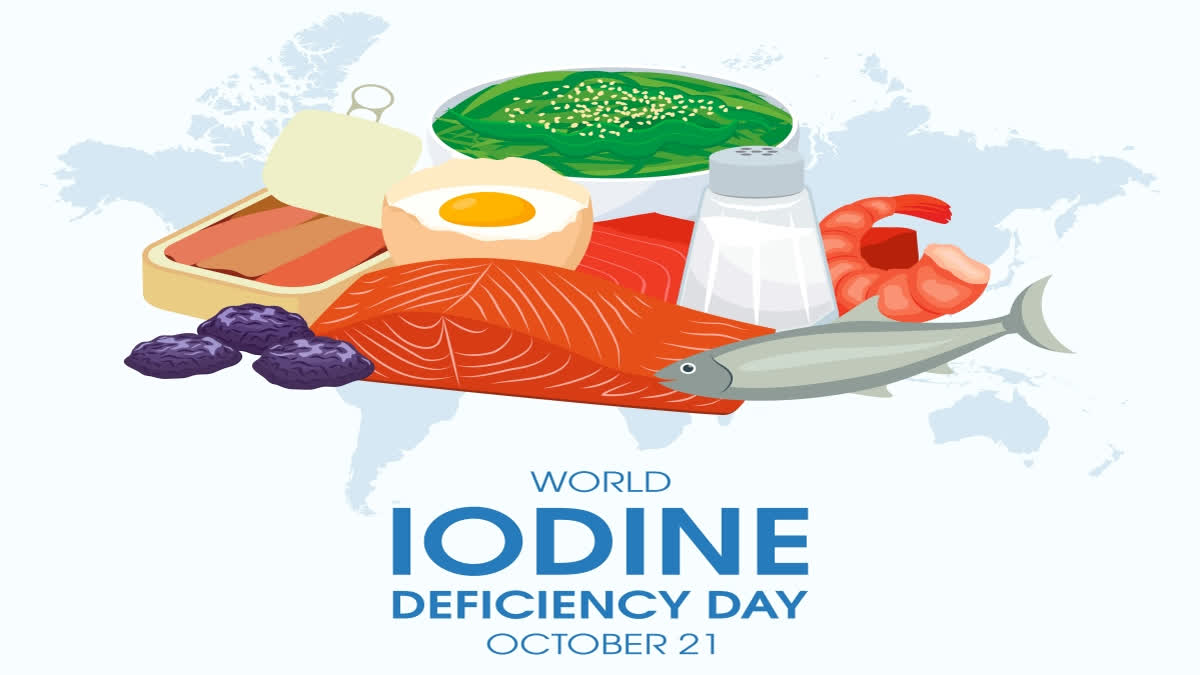Hyderabad: In an effort to combat iodine deficiency disorders worldwide, the International Council for the Control of Iodine Deficiency Disorders (ICCIDD) initiated the World Iodine Deficiency Disorders Prevention Day on Oct. 21, 1992. The day serves as a global platform to shed light on the critical role of iodine in our daily diet and its profound impact on the health and development of living organisms.
History- The history of the day of iodine dates back to the early 19th century when Bernard Courtois, a French chemist, observed an unusual purple cloud emanating from seaweed ash heated with sulfuric acid in 1811. This observation laid the foundation for understanding iodine's connection to health.
- In 1896, Eugen Baumann confirmed iodine's presence in the thyroid gland, revealing its role in thyroid function.
- By 1980, the World Health Organization (WHO) took steps to reduce global iodine deficiency.
- In 1852, Gaspard Adolphe Chatin linked goiter to iodine deficiency, further emphasizing the need for iodine in our diets.
- In 1924, the commercialization of iodized salt began, revolutionizing the prevention of iodine deficiency.
- Finally, in 1993, universal salt iodisation emerged as a pivotal technique for controlling iodine deficiency disorders.
Significance of Iodine- Iodine plays an important role in maintaining the health of the thyroid gland, which, in turn, affects various bodily functions such as heart rate, metabolism, body temperature, and muscle movements.
Iodine also regulates the rate at which dying cells are replaced. When iodine is deficient, the thyroid gland enlarges to capture more iodine from the bloodstream, leading to goiter. Beyond goiter, prolonged iodine deficiency can result in hypothyroidism, particularly affecting pregnant and breastfeeding women and infants.
Iodine is essential as it-
- Ensures proper thyroid function, influencing metabolism and overall health.
- Boosts the immune system and maintains a healthy hormonal balance.
Objective-
- Raising awareness about the health consequences of iodine deficiency.
- Promoting universal salt iodisation for improved nutrition.
- Preventing cognitive and developmental issues resulting from iodine deficiency.
- Collaborating globally to ensure access to iodine-rich foods and supplements.
- Educating communities about iodine's vital role in growth and well-being.
- Advocating for policies that support iodine-rich diets and supplementation.
- Monitoring progress and addressing challenges in the fight against iodine deficiency.
- Working towards a healthier future for all through sustained efforts.
Myths about Iodine-
Two common myths surround iodine:
Myth 1- We get enough iodine from iodised salt.
Fact- Iodised salt is insufficient to meet the body's iodine requirements, especially in our current environment. The minimal iodine content in refined salt falls far short of the amount needed for optimal thyroid function.
Myth 2- Iodine supplements worsen thyroid disorders.
Fact- Lack of iodine causes hypothyroidism. Iodine supplements can safely treat thyroid disorders resulting from iodine deficiency.
The best way to remain healthy is to consume a diet that contains a variety of nutrients rather than focusing on standalone minerals. The best way to get iodine is by adding it to your diet than popping supplements unless prescribed by a doctor. Following are the iodine-rich food sources that can help prevent iodine deficiency-
- Seaweed- One of the best sources, a 10-gram serving of dried nori seaweed contains about 200 mcg of iodine which is a little more than the daily requirement.
- Iodised Salt- Iodized salt is now recognized worldwide as the most effective way the administration of supplemental iodine in the body.
- Non-Fat Milk- Dairy is also a great source of iodine available to mankind. A 200 ml serving of non-fat cow’s milk contains 85 mcg of iodine.
- Greek Yogurt- Greek yogurt is an excellent source of iodine and has a higher concentration of iodine as compared to the normal one.
- Eggs- Eggs, specifically egg yolks, are a fabulous source of iodine. One large egg contains 26 mcg of iodine.
In summary:
- Global Iodine Deficiency Disorders Prevention Day is observed on October 21.
- It emphasises the importance of iodine for health.
- The day focuses on preventing and addressing iodine deficiency disorders.
- Iodized salt and proper nutrition are key themes.
- Collaboration is crucial for combating iodine deficiency globally.
- Approximately 1.9 billion people worldwide are at risk of iodine deficiency disorders.
- Cognitive impairments, goiter, and pregnancy risks are consequences of iodine deficiency.
- The ICCIDD plays a vital role in awareness and prevention efforts.
- Developing countries' populations are disproportionately affected by iodine deficiency.
- Iodine's role extends beyond thyroid health, affecting immune function.



